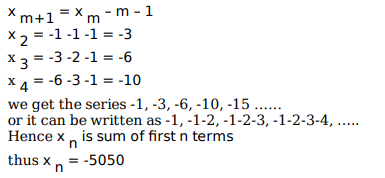Live Updates
• CATKing has launched new chat bot.

• New video on Logs has been released.
13.2K
Learners
asked the doubt

Previous Year Questions
The passage below is accompanied by a set of questions. Choose the best answer to each question.
Nature has all along yielded her flesh to humans. First, we took nature's materials as food, fibers, and shelter. Then we learned to extract raw materials from her biosphere to create our own new synthetic materials. Now Bios is yielding us her mind-we are taking her logic.
Clockwork logic-the logic of the machines-will only build simple contraptions. Truly complex systems such as a cell, a meadow, an economy, or a brain (natural or artificial) require a rigorous nontechnological logic. We now see that no logic except bio-logic can assemble a thinking device, or even a workable system of any magnitude.
It is an astounding discovery that one can extract the logic of Bios out of biology and have something useful. Although many philosophers in the past have suspected one could abstract the laws of life and apply them elsewhere, it wasn't until the complexity of computers and human-made systems became as complicated as living things, that it was possible to prove this. It's eerie how much of life can be transferred. So far, some of the traits of the living that have successfully been transported to mechanical systems are: self-replication, self-governance, limited self-repair, mild evolution, and partial learning.
We have reason to believe yet more can be synthesized and made into something new. Yet at the same time that the logic of Bios is being imported into machines, the logic of Technos is being imported into life. The root of bioengineering is the desire to control the organic long enough to improve it. Domesticated plants and animals are examples of technos-logic applied to life. The wild aromatic root of the Queen Anne's lace weed has been fine-tuned over generations by selective herb gatherers until it has evolved into a sweet carrot of the garden; the udders of wild bovines have been selectively enlarged in a "unnatural" way to satisfy humans rather than calves. Milk cows and carrots, therefore, are human inventions as much as steam engines and gunpowder are. But milk cows and carrots are more indicative of the kind of inventions humans will make in the future: products that are grown rather than manufactured.
Genetic engineering is precisely what cattle breeders do when they select better strains of Holsteins, only bioengineers employ more precise and powerful control. While carrot and milk cow breeders had to rely on diffuse organic evolution, modern genetic engineers can use directed artificial evolution-purposeful design-which greatly accelerates improvements.
The overlap of the mechanical and the lifelike increases year by year. Part of this bionic convergence is a matter of words. The meanings of "mechanical" and "life" are both stretching until all complicated things can be perceived as machines, and all self-sustaining machines can be perceived as alive. Yet beyond semantics, two concrete trends are happening: (1) Human-made things are behaving more lifelike, and (2) Life is becoming more engineered. The apparent veil between the organic and the manufactured has crumpled to reveal that the two really are, and have always been, of one being.
The author claims that, "Part of this bionic convergence is a matter of words". Which one of the following statements best expresses the point being made by the author?
Video Explanation

Which one of the following sets of words/phrases best serves as keywords to the passage?
Video Explanation

None of the following statements is implied by the arguments of the passage, EXCEPT:
Video Explanation

The author claims that, "The apparent veil between the organic and the manufactured has crumpled to reveal that the two really are, and have always been, of one being." Which one of the following statements best expresses the point being made by the author here?
Video Explanation

The passage below is accompanied by a set of questions. Choose the best answer to each question.
I’ve been following the economic crisis for more than two years now. I began working on the subject as part of the background to a novel, and soon realized that I had stumbled across the most interesting story I’ve ever found. While I was beginning to work on it, the British bank Northern Rock blew up, and it became clear that, as I wrote at the time, “If our laws are not extended to control the new kinds of super-powerful, super-complex, and potentially super-risky investment vehicles, they will one day cause a financial disaster of global-systemic proportions.” . . . I was both right and too late, because all the groundwork for the crisis had already been done—though the sluggishness of the world’s governments, in not preparing for the great unraveling of autumn 2008, was then and still is stupefying. But this is the first reason why I wrote this book: because what’s happened is extraordinarily interesting. It is an absolutely amazing story, full of human interest and drama, one whose byways of mathematics, economics, and psychology are both central to the story of the last decades and mysteriously unknown to the general public. We have heard a lot about “the two cultures” of science and the arts—we heard a particularly large amount about it in 2009, because it was the fiftieth anniversary of the speech during which C. P. Snow first used the phrase. But I’m not sure the idea of a huge gap between science and the arts is as true as it was half a century ago—it’s certainly true, for instance, that a general reader who wants to pick up an education in the fundamentals of science will find it easier than ever before. It seems to me that there is a much bigger gap between the world of finance and that of the general public and that there is a need to narrow that gap, if the financial industry is not to be a kind of priesthood, administering to its own mysteries and feared and resented by the rest of us. Many bright, literate people have no idea about all sorts of economic basics, of a type that financial insiders take as elementary facts of how the world works. I am an outsider to finance and economics, and my hope is that I can talk across that gulf.
My need to understand is the same as yours, whoever you are. That’s one of the strangest ironies of this story: after decades in which the ideology of the Western world was personally and economically individualistic, we’ve suddenly been hit by a crisis which shows in the starkest terms that whether we like it or not—and there are large parts of it that you would have to be crazy to like—we’re all in this together. The aftermath of the crisis is going to dominate the economics and politics of our societies for at least a decade to come and perhaps longer.
Which one of the following, if false, could be seen as supporting the author’s claims?
Video Explanation

Which one of the following, if true, would be an accurate inference from the first sentence of the passage?
Video Explanation

Which one of the following best captures the main argument of the last paragraph of the passage?
Video Explanation

All of the following, if true, could be seen as supporting the arguments in the passage, EXCEPT:
Video Explanation

According to the passage, the author is likely to be supportive of which one of the following programmes?
Video Explanation

Previous year papers
2024
2023
2022
2021
2020
2019
2018


